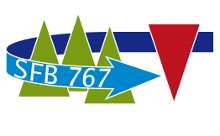Posted in 2012
Book out
Today Jeroen Danon has sent to Cambridge University Press the manuscript of our textbook "Advanced Quantum Mechanics". This is an important stage of this project. The book was difficult to finalize. I was pretty much overwhelmed with this work that I had to carry out on the backgound of less pleasant events and at cost of postponing many urgent tasks. It was the reason not to write to this blog for weeks. I hope to recuperate soon.
Ascension
is today, at least according to my calender. Have a blessed day today, whether it is a feast for you or not.
Chirst is risen
for me as well. I’m bound with all things I have or had to do urgently and experience a hopelessly collapsing schedule. My Lord, let my brain and typing fingers to attend these matters and set my soul free to enjoy your feast.
Christ is risen, dear reader!
Quantum Noise and Measurement in Engineered Electronic Systems
This workshop is about to be officially announced, look here. Below is the announcement:)
Quantum Noise and Measurement in Engineered Electronic Systems
International Workshop – 8 – 12 October 2012
Scientific Coordinators:
Wolfgang Belzig (Universität Konstanz, Germany)
Michel Devoret (Yale University, USA)
Yuli V. Nazarov (TU Delft, The Netherlands)
Organisation:
Katrin Lantsch (Max-Planck-Institut für Physik komplexer Systeme Dresden, Germany)
Supported by the SFB 767 "Controlled Nanosystems" 
The aim to manipulate, control, and measure electronic devices at the single quantum level has shaped the last decade in mesocopic physics. The measurement procedure itself, as well as the effect of a dissipative environment, are intrinsically quantum in these systems, which poses a challenge to experimentalists as well as theorists. These problems are common for the full counting statistics of electrons passing in a nanodevice, fluctuations and amplification in quantum-limited complex circuits, and the next-generation qubit schemes. The workshop strives to achieve the synergy of these research fields at the level of theory and experiment.
The list of invited speakers includes:
T. Brandes (Berlin, Germany), M. Büttiker (Geneva, Switzerland), A. Clerk (Montreal, Canada), L. DiCarlo (Delft, The Netherlands), K. Ensslin (Zürich, Switzerland), D. Esteve (Gif-sur-Yvette, France), Y. Gefen (Rehovot, Israel), S. Girvin(New Haven, USA), D.C. Glattli (Gif-sur-Yvette, France), M. Heiblum (Rehovot, Israel), T. Kippenberg (Lausanne, Switzerland), J. König (Duisburg, Germany), T. Kontos (Paris, France), G.B. Lesovik (Moscow, Russia), L. Levitov(Cambridge, USA), F. Marquardt (Erlangen, Germany), T. Martin (Marseille, France), K. Mølmer (Aarhus, Denmark),J. Pekola (Aalto, Finland), B. Reulet (Sherbrooke, Canada), R. Schoelkopf (New Haven, USA), G. Schön (Karlsruhe, Germany), C. Schönenberger (Basel, Switzerland), I. Siddiqi (Berkeley, USA), J. van Ruitenbeek (Leiden, The Netherlands), F. von Oppen (Berlin, Germany), A. Wallraff (Zürich, Switzerland)
Applications for participation and poster or oral contributions are welcome and should be made by using the application form on the workshop’s web page. The number of attendees is limited. The registration fee for the workshop is 120 EUR and should be paid by all participants. Costs for accommodation and meals will be covered by the Max Planck Institute for the Physics of Complex Systems. Limited funding is available to partially cover travel expenses. Please note that childcare is available upon request.
Applications received before 31 July 2012 are considered preferentially.
For further information please e-mail to:
qnm12 pks.mpg.de
pks.mpg.de
Seventh Lecture Advanced Statistical Physics
has taken place today. It was a switch to the second book of Kardar. The lecture has began very philosophical since we’ve discussed reductionism, emerging complexity and all that. So surprise I got distracted and could not say much about the methods… What a pity, again a delay. The next lecture will be on Monday.
Sixth lecture Advanced Statistical Physics
Was devoted to a standard topic: statistics of ideal quantum gases. The Bose-condensation was a bit overloaded with details and did not go well. Must revise it next year. Otherwise, the lecture was affordable.
Thanks for 1 MB views!
So I am pleased to report another doubling of number of views. It took 531 day to achieve this. Thank you very much, dear reader, for sticking to this blog despite all the variety you can find elsewhere. This is motivating. I am happy with this.
Microkelvin 2012
I’m now in Slovakia attending a meeting of European MicroKelvin Collaboration, large network of low-temperature groups. I do not participate in the network and got invited because my temperature fluctuation exercises that, rather unexpectedly, get along with a burst of interest in non-equilibrium thermodynamics of small systems. In comparison with a generic conference, the talks over here are more serious and provide (interesting) technical details: people speak to equally knowlegeable colleagues and expect a usefull feedback. I enjoy this, although frequently it is tough to follow.
Quantum phase slips in superconducting wires with weak inhomogeneities
is finally accepted by Physical Review Letters, in seven months after the submission. Phase slips rock!
Fifth Lecture Advanced Statistical Mechanics 2012
did not go too bad. Guess I could explain use and complexity of perturbation theory in the context. There were also many students.
(At least) two things could go better. 1. I did not exlpain the realtion between cumulants and connected/disconnected diagramms. Fortunately, I got a question, and though I did not manage to gasp it fast, it was exteremly helpful. 2. I should have spent more time on critical point explaining the significance and uniqness of Taylor expansion.
